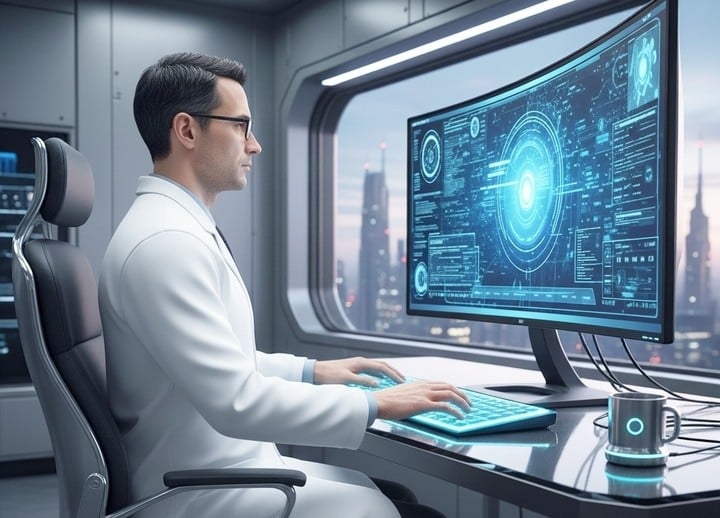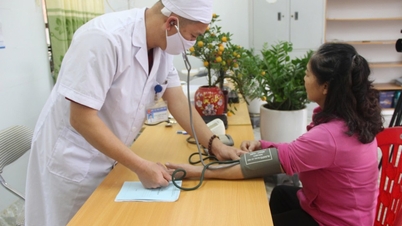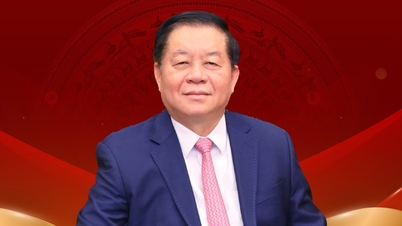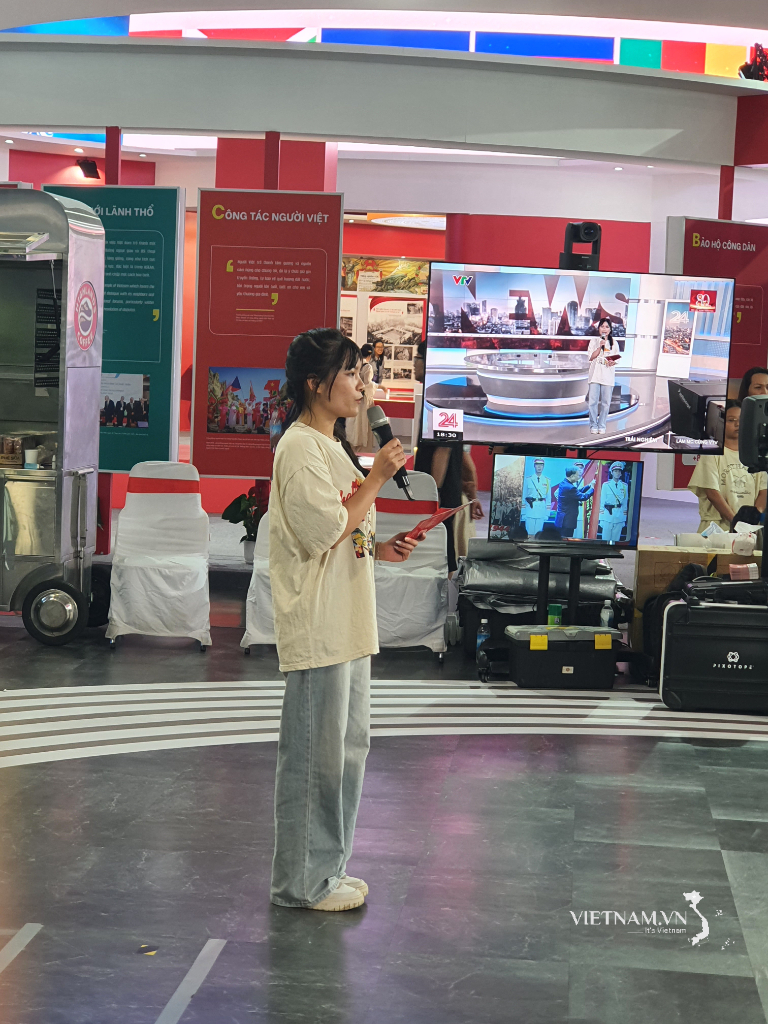According to Dr. Tran Van Phuc, Saint Paul Hospital, Hanoi , recently there have been many predictions about artificial intelligence (AI) will develop strongly, possibly replacing humans in many fields, causing many jobs to be affected or even disappear, including jobs in the medical field.
For those in white coats, that prospect does not make them pessimistic. “ As long as there are people, there will be a need for flesh-and-blood doctors ,” said Dr. Phuc.
Medicine is not just a matter of knowledge and skills. Doctors must have sensitivity, keen observation and courage in the face of unexpected situations - something that machines can never do.
Thirty years ago, as a medical student, he heard many programmers dream of the day when computers were smart enough to “eradicate” the medical profession. They believed that given enough data, AI would diagnose thousands of times more accurately than humans, but that dream has yet to come true.
In fact, AI helps hospitals reduce many manual steps. While the reception desk used to require 30 employees to take notes and arrange files, now the automatic queuing machine only needs a few supervisors. However, when entering the examination room, where every diagnosis is tied to each breath and each specific pain, AI is still just a support tool.

Dr. Phuc recalled a recent case where a colleague’s mother had pain in the right iliac fossa for many days, and all tests were normal. “ I gently stroked the skin, the patient was in excruciating pain, but when I pressed hard, there was no pain. I knew right away that it was shingles - something that is not written in books, but is experience gained from decades of experience ,” said Dr. Phuc. In this situation, “AI is definitely helpless.”
In another case, the patient had severe abdominal pain and was sweating, but the X-rays and tests were all normal. A sensitive doctor would immediately think of doing an electrocardiogram, and sometimes detect a heart attack – something the automated system might miss.
EKGs have had a “self-diagnosis” feature for a long time, but doctors still have to reread them, because the machine only recognizes common patterns and cannot handle rare cases or operating errors – such as misplacing the electrodes, causing the machine to “think” the heart is in reverse.
In the field of diagnostic imaging - where AI is most developed, the role of the doctor is still irreplaceable. The machine can measure and mark abnormal areas, but the final conclusion requires human experience and intuition.
“ I once encountered a case of prolonged fever, the CT scan was read by the machine and the doctor at the lower level as normal. When I examined it carefully, I suspected that some of the brain's gyri were blurred, so I asked for the patient's medical history again, and it turned out that the patient parasitic infection. Thanks to proper treatment, the patient recovered quickly,” he said.
According to Dr. Tran Van Phuc, AI can only handle standard procedures, while medicine is full of exceptions. Each patient has a different story, some hide their illness, some do not trust doctors, some arbitrarily increase or decrease the dose of medication. “ Examining a patient is not like repairing a car, because there is a human element. AI cannot read worried eyes, or feel when a patient just frowns slightly ,” said Dr. Phuc.
He also mentioned the responsibility aspect, if AI makes a wrong diagnosis, who is responsible? It cannot be just 'smashing the keyboard and getting it done' when human lives are affected.
The future of medicine is not a war between humans and machines, but a symbiosis. AI will reduce manual labor by up to 90%, giving doctors more time for what matters most: listening and connecting with patients.
“ Artificial intelligence is a miracle of humanity, but the only feeling that makes medicine humane is that only humans have ,” he concluded.
Sharing the same view, Dr. Truong Huu Khanh, former Head of the Department of Infectious Diseases and Neurology, Children's Hospital 1 (HCMC), commented that in medicine, AI cannot replace the clinical and human roles. AI can support many fields, but in the medical field, the experience, sensitivity and heart of a doctor are things that machines cannot copy.
Each patient needs to be examined directly and comprehensively, not just based on a few symptoms described online to diagnose. The doctor must observe, palpate, tap, listen, ask carefully about the patient's medical history and evaluate the general condition to be able to make an accurate conclusion.
Dr. Khanh believes that AI or "internet doctors" can be considered a source of information, helping people understand more about health and disease prevention. However, they cannot replace real doctors.
AI only provides general information and cannot assess internal organ damage, medical history, or drug reactions of each individual. Self-diagnosis and treatment based on “chatbot suggestions” pose many risks, especially for chronic diseases.
Source: https://baolangson.vn/ai-khong-the-doc-duoc-anh-mat-lo-lang-hay-cam-nhan-noi-dau-cua-benh-nhan-5063828.html


![[Photo] Ho Chi Minh City Youth Take Action for a Cleaner Environment](https://vphoto.vietnam.vn/thumb/1200x675/vietnam/resource/IMAGE/2025/11/04/1762233574890_550816358-1108586934787014-6430522970717297480-n-1-jpg.webp)

![[Photo] The road connecting Dong Nai with Ho Chi Minh City is still unfinished after 5 years of construction.](https://vphoto.vietnam.vn/thumb/1200x675/vietnam/resource/IMAGE/2025/11/04/1762241675985_ndo_br_dji-20251104104418-0635-d-resize-1295-jpg.webp)

![[Photo] Ca Mau "struggling" to cope with the highest tide of the year, forecast to exceed alert level 3](https://vphoto.vietnam.vn/thumb/1200x675/vietnam/resource/IMAGE/2025/11/04/1762235371445_ndo_br_trieu-cuong-2-6486-jpg.webp)
![[Photo] Panorama of the Patriotic Emulation Congress of Nhan Dan Newspaper for the period 2025-2030](https://vphoto.vietnam.vn/thumb/1200x675/vietnam/resource/IMAGE/2025/11/04/1762252775462_ndo_br_dhthiduayeuncbaond-6125-jpg.webp)































































































Comment (0)